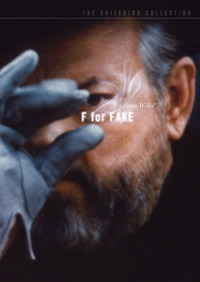A film review by Shane Lavalette /Journal, November 10, 2007:
 Orson Welles is generally known for his 1938 radio broadcast of the science fiction novella War of the Worlds. If not for that, then for co-writing, directing, producing and starring in Citizen Kane (1941), commonly referred to as “the greatest film ever made.” Orson Welles is, however, not so known for his last major film, F For Fake (1974) – a pseudo-documentary and playful meditation on “art, experts and fakery.” Here”™s a quick synopsis taken from The Criterion Collection (released the film on DVD in 2005):
Orson Welles is generally known for his 1938 radio broadcast of the science fiction novella War of the Worlds. If not for that, then for co-writing, directing, producing and starring in Citizen Kane (1941), commonly referred to as “the greatest film ever made.” Orson Welles is, however, not so known for his last major film, F For Fake (1974) – a pseudo-documentary and playful meditation on “art, experts and fakery.” Here”™s a quick synopsis taken from The Criterion Collection (released the film on DVD in 2005):
Trickery. Deceit. Magic. In Orson Welles”™ free-form documentary F for Fake, the legendary filmmaker (and self-described charlatan) gleefully engages the central preoccupation of his career””the tenuous line between truth and illusion, art and lies. Beginning with portraits of world-renowned art forger Elmyr de Hory and his equally devious biographer, Clifford Irving, Welles embarks on a dizzying cinematic journey that simultaneously exposes and revels in fakery and fakers of all stripes””not the least of whom is Welles himself. Charming and inventive, F for Fake is an inspired prank and a searching examination of the essential duplicity of cinema.
The critical reaction to F for Fake ranged from praise to confusion, with many (especially in Welles”™ home country) finding the work to be “indulgent” and “incoherent,” rejecting it on these grounds. But over the years, the film has grown to be not only widely accepted but also considered a classic.
I loved the film for the avant-garde editing, with short cuts (almost by the second) throughout. Never before have I seen a “documentary” assembled in this fashion and never would I imagine it working so well. Additionally, film”™s story and underlying themes held my attention.
“It”™s pretty but is it art?,” asks Welles. “How is it valued? The value depends on opinion, opinion depends on the expert, a faker like Elmyr makes fool of the experts – so who”™s the expert? Who”™s the faker?” The film questions whether or not it matters that a work of art is “fake” if it”™s still a masterpiece, made by hand. And furthermore, as Welles”™ narrates,
Our works in stone, in paint, in print, are spared, some of them, for a few decades or a millennium or two, but everything must finally fall in war, or wear away into the ultimate and universal ash – the triumphs, the frauds, the treasures and the fakes. A fact of life: we”™re going to die. “Be of good heart,” cry the dead artists out of the living past. “Our songs will all be silenced, but what of it? Go on singing.” Maybe a man”™s name doesn”™t matter all that much…
image: criterion.com
